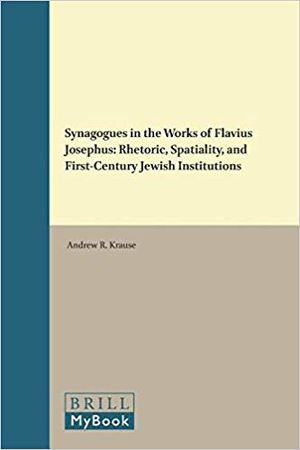Synagogues in the Works of Flavius Josephus (2017 Krause), book
Synagogues in the Works of Flavius Josephus: Rhetoric, Spatiality, and First-Century Jewish Institutions (2017) is a book by Andrew R. Krause.
Abstract
"In Synagogues in the Works of Flavius Josephus, Andrew Krause analyses the place of the synagogue within the cultural and spatial rhetoric of Flavius Josephus. Engaging with both rhetorical critical methods and critical spatial theories, Krause argues that in his later writings Josephus portrays the Jewish institutions as an important aspect of the post-Temple, pan-diasporic Judaism that he creates. Specifically, Josephus consistently treats the synagogue as a supra-local rallying point for the Jews throughout the world, in which the Jewish customs and Law may be practiced and disseminated following the loss of the Temple and the Land. Conversely, in his earliest extant work, Bellum judaicum, Josephus portrays synagogues as local temples in order to condemn the Jewish insurgents who violated them."--Publisher description.
Editions
Published in Leiden : Brill, 2017.
Contents
Acknowledgments -- Abbreviations -- Introduction -- Review of past research -- Early synagogues -- Synagogues in Josephus -- Josephus as a historical source -- Theory, methodology, and prospect -- The ideal synagogue and ancestral customs in antiquitates judaicae -- The rhetorical structure of antiquitates judaicae -- Antiquitates judaicae 12-16 -- Narratives and speeches in AJ 12-16 -- Roman acta and the place of the synagogue in Josephus' judaism -- Compositional and dating issues -- The contents and significance of the roman acta -- Conclusion -- Antiquitates judaicae 1-11 -- Josephus' 'Bible' -- Josephus' biblical text -- Josephus' biblical paraphrase in historiographic context -- Public assemblies in Josephus' biblical paraphrase -- Moses' ... and the ancestral traditions -- Conclusion -- Antiquitates judaicae 17-20 -- Movement towards the revolt in AJ 17-20 -- The dora synagogue crisis in context -- Conclusion -- Summary and conclusion -- The synagogue as ideal association and historical people's assembly in vita -- Josephus as autobiographer -- Vita 271-303 on the synagogue -- Assemblies -- Fasting and communal sabbath meals -- Piety and religious obligations -- Conclusion -- Synagogue as an ideal educational institution in Contra Apionem -- Context and rhetoric of Contra Apionem -- Place within the Josephan corpus -- Rhetorical structure -- Ethnicity -- Law and constitution -- Proper and improper synagogues in C.Ap. 2 -- Education and its place within the synagogue and roman culture -- Conclusion -- Synagogue as (contrived) holy place in Bellum Judaicum -- Context and rhetoric of Bellum Judaicum -- '..., temples, and triumphs in Bellum Judaicum -- The caesarea synagogue as a constructed and bound space -- Conclusion -- Conclusion : synagogues in Josephus and his world -- Historical implications and contextualization -- The nature of the early synagogue -- Synagogue terminology in Josephus -- Synagogue activities -- Synagogue officials -- Synagogue origins -- Synagogues in Jewish-Roman relations -- Synagogue space -- On reading history and culture in Josephus -- Appendix : essenes in the writings of Josephus -- Bibliography -- Modern author index -- Ancient source index.
External links
- [ Google Books]
